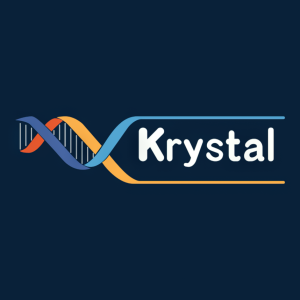Krystal Biotech Announces First Patient Dosed in Phase 1/2 Trial of KB801 for the Treatment of Neurotrophic Keratitis
Rhea-AI Summary
Krystal Biotech (NASDAQ: KRYS) has initiated its Phase 1/2 clinical trial EMERALD-1 with the first patient dosed using KB801, an innovative eye drop gene therapy for treating neurotrophic keratitis (NK). The trial is a randomized, double-masked, multicenter, placebo-controlled study that will enroll up to 27 adults with Stage 2 or Stage 3 NK.
The study will evaluate KB801's safety and efficacy, administered twice weekly for 8 weeks. NK is a degenerative corneal disease affecting an estimated 68,000 patients in the United States as of 2024, marking a significant 115% increase from 31,000 patients in 2020. The therapy aims to overcome current limitations in treating corneal epithelial defects through sustained protein expression via simple eye drop application.
Positive
- Novel eye drop gene therapy approach for sustained protein expression
- Significant market opportunity with NK patient claims increasing 115% from 2020 to 2024
- Addresses an unmet medical need in a degenerative corneal disease
Negative
- Early-stage clinical trial with uncertain outcomes
- Small trial size of only 27 patients may limit statistical significance
News Market Reaction 1 Alert
On the day this news was published, KRYS gained 3.88%, reflecting a moderate positive market reaction.
Data tracked by StockTitan Argus on the day of publication.
Eye drop administration of KB801 designed to enable sustained expression of NGF in the front of the eye
Investor call and webcast to be held July 9 at 8:30 am ET to discuss program and trial design
PITTSBURGH, July 09, 2025 (GLOBE NEWSWIRE) -- Krystal Biotech, Inc. (the “Company”) (NASDAQ: KRYS) announced today that the first patient has been dosed in its Phase 1/2 clinical trial (“EMERALD-1”), a 2:1 randomized, double-masked, multicenter, placebo-controlled study evaluating KB801 for the treatment of neurotrophic keratitis (NK).
“Our ophthalmology pipeline is well under way with the dosing of our first patient in EMERALD-1, along with initiation of our Phase 3 IOLITE study in DEB,” said Suma Krishnan, President, Research & Development, Krystal Biotech, Inc. “Until now, rapid protein clearance rates and high cell turnover in the front of the eye have severely limited the therapeutic potential of biologics and gene therapies for the treatment of corneal epithelial defects and other front of the eye diseases. We now have an opportunity to drive sustained expression and repeat administration of therapeutic biologic payloads with a simple eye drop application and look forward to delivering meaningful benefit to NK patients in need.”
KB801 is a redosable eye drop gene therapy in development for the treatment of NK, a degenerative corneal disease characterized by damage or loss of function in the neurons innervating the eye leading to corneal epithelial defects, ulcers, and perforation. Left untreated, NK can result in severe vision loss. Although NK is a rare disease with an estimated prevalence in the range of 10 to 50 cases per 100,000, claims data analyses suggest awareness and diagnosis rates are on the rise in the United States. Based on available claims data, an estimated 68,000 patients in the United States had a NK claim in 2024, up over
EMERALD-1 is a randomized, double-masked, multicenter, placebo-controlled study evaluating KB801, administered as an eye drop, for the treatment of NK. Up to 27 adults with Stage 2 or Stage 3 NK, as defined by the Mackie criteria, will be enrolled and randomized 2:1 to receive either KB801, at a concentration of 1010 PFU/mL, or placebo topically to the study eye twice weekly for 8 weeks.
The primary objective of EMERALD-1 is to evaluate the safety and tolerability of topical ocular administration of KB801 in patients with NK. The secondary objective is evaluation of efficacy based on the proportion of patients with complete durable healing of corneal epithelium at 8 weeks, defined as 0 mm corneal fluorescein staining in the area of the corneal lesion at both week 8 and 0 mm corneal fluorescein staining in the same area at week 10, as assessed by a masked reader. Additional exploratory efficacy measures will include change in corneal lesion size from baseline, each assessed at weeks 4, 6, 8, 10, and 20, as well as evaluations of corneal sensation and patient-reported symptom burden. More details of the EMERALD-1 study can be found at www.clinicaltrials.gov under NCT identifier NCT06999733.
The Company will host an investor conference call and webcast today, Wednesday, July 9, 2025, at 8:30 am ET, to discuss NK, the KB801 program, and clinical study design. Investors and the general public can access the live webcast at: https://www.webcaster4.com/Webcast/Page/3018/52704. For those unable to listen to the live webcast, an archived version will also be available on the Investors section of the Company’s website for at least 30 days.
About KB801
KB801 is a redosable eye drop gene therapy designed to enable sustained, localized expression and secretion of nerve growth factor (NGF) by epithelial cells in the front of the eye for the treatment of neurotrophic keratitis (NK), a rare, degenerative corneal disease that leads to corneal epithelial defects, ulcers, and perforation. Recombinant NGF eye drops have been shown to significantly improve corneal healing and are approved for the treatment of NK in multiple jurisdictions worldwide, but rapid clearance from the eye requires intensive administration six times a day, limiting therapeutic utility. By enabling the cells of the front of the eye to produce NGF locally, KB801 has the potential to significantly reduce the treatment burden for patients while also maintaining more consistent NGF levels in the front of the eye.
About Krystal Biotech, Inc.
Krystal Biotech, Inc. (NASDAQ: KRYS) is a fully integrated, commercial-stage, global biotechnology company focused on the discovery, development and commercialization of genetic medicines to treat diseases with high unmet medical needs. VYJUVEK®, the Company’s first commercial product, is the first-ever redosable gene therapy and the first genetic medicine approved by the FDA and EMA for the treatment of dystrophic epidermolysis bullosa. The Company is rapidly advancing a robust preclinical and clinical pipeline of investigational genetic medicines in respiratory, oncology, dermatology, ophthalmology, and aesthetics. Krystal Biotech is headquartered in Pittsburgh, Pennsylvania. For more information, please visit http://www.krystalbio.com, and follow @KrystalBiotech on LinkedIn and X (formerly Twitter).
Forward-Looking Statements
Any statements in this press release about future expectations, plans and prospects for Krystal Biotech, Inc.’s product candidate, KB801, and its EMERALD-1 clinical trial evaluating KB801 for the treatment of neurotrophic keratitis (NK), including statements about the potential of KB801 to significantly reduce the treatment burden for NK patients while also maintaining more consistent NGF levels in the front of the eye resulting in meaningful benefits to NK patients; the estimated prevalence of NK and the expectation, based on claims data analyses, that awareness and diagnosis rates are on the rise in the United States; the EMERALD-1 trial design, including the expected number of patients that will be participating in the study and the study objectives; and other statements containing the words “anticipate,” “believe,” “estimate,” “expect,” “intend,” “may,” “plan,” “predict,” “project,” “target,” “potential,” “likely,” “will,” “would,” “could,” “should,” “continue,” and similar expressions, constitute forward-looking statements within the meaning of The Private Securities Litigation Reform Act of 1995. Actual results may differ materially from those indicated by such forward-looking statements as a result of various important factors, including uncertainties inherent in the initiation and conduct of clinical trials, as well as regulatory review of clinical trials and applications for marketing approvals; and such other important factors as are set forth under the caption “Risk Factors” in the Company’s annual and quarterly reports on file with the U.S. Securities and Exchange Commission. The forward-looking statements included in this press release represent the Company’s views as of the date of this press release. The Company anticipates that subsequent events and developments will cause its views to change. However, while the Company may elect to update these forward-looking statements at some point in the future, it specifically disclaims any obligation to do so. These forward-looking statements should not be relied upon as representing the Company’s views as of any date subsequent to the date of this press release.
CONTACT
Investors and Media:
Stéphane Paquette, PhD
Krystal Biotech
spaquette@krystalbio.com










